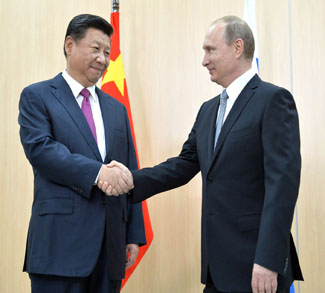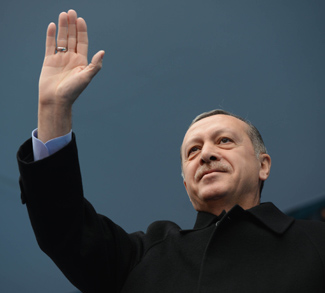Much has been made of the common cause between Russia and China recently in their quests for a more multi-polar world with respect to U.S. power. Recent examples of this burgeoning relationship include Russia’s presence in early September at China’s celebrations to commemorate the end of World War II in Asia, as well as Russia’s $400 billion 30-year gas deal with China. However, for strategic and economic reasons, Japan is truly the preferred Russian partner in Asia.
Familiarity Breeds Contempt
Proximity to powerful neighbors breeds suspicion and fear. As the world’s largest country geographically, Russia has a lot of territory to potentially lose. Officially, Russia resolved the last of its territorial issues in China with the 2004 Complementary Agreement. However, there are elements within Russia’s siloviki (officials with security services backgrounds) who eye the country’s Far Eastern border with China warily due to the region’s sparse population and abundant natural resources.
Even more important from a historical standpoint is the 1858 Treaty of Aigun, which ceded northern Qing Dynasty territory to the Russian Empire. Still considered an “unequal treaty” by China to this day and signed into effect during a time of Chinese weakness during the Opium Wars, this agreement must be put into the context of Hong Kong, Macau, and even Taiwan. In other words, it represents a previous loss of territory by the Chinese which has not been forgotten and will eventually be reclaimed, whether through diplomatic, economic, or military means. It’s not hard for Russia to imagine China one day referring to the Russian Far East as belonging to it since “ancient times,” the claim it’s currently using in the South China Sea against its interlocutors there.
Heartland Theory
According to Halford Mackinder’s Heartland Theory, “Who rules East Europe commands the Heartland; Who rules the Heartland commands the World Island; Who rules the World Island commands the World.” The clear implication is that while many may seek hegemony in the Heartland, only one state will actually achieve it. Recently, Russia decided to merge its Eurasian Economic Union with China’s Silk Economic Road, but only after heated debate in Moscow, probably similar in tone to Washingtonian debates among hawks and their counterparts who prefer economic engagement with Beijing.
Even though China is not an Arctic state, it has made several overtures to become more active in the workings of the Arctic Council. Both China and Japan have the financial resources to help Russia to develop its Arctic territories, but Russia has been more reticent in allowing Chinese influence into the Arctic rather than Japanese. This is because it does not fear Japan strategically, whereas with China, it’s wary of being surrounded by Chinese economic influence in the south in Central Asia and in the north in the Arctic. If this happened, China would have access to untold resources in the Heartland and, hence, the World Island.
Rough Riding in the Pacific
The first truly realist U.S. President, Theodore Roosevelt, helped broker the agreement which eventually led to the end of the Russo-Japanese war in 1905. This was not done for purely altruistic reasons, although Roosevelt garnered the Nobel Peace Prize the following year for his efforts. It was done because he realized that both powers had the ability to check not only U.S. ambitions in the Pacfic theater, but each other as well. Thus, “offshore balancing” became official U.S. foreign policy with respect to Asia. Additionally, the British also saw the value of using Japan as a junior partner to balance Russian ambitions in the Pacific.
Seeing how the Western powers used Japan to check its freedom of maneuver before, Russia needs to come to some sort of agreement with Japan to ensure this episode does not repeat itself. Even though Russia is far closer to Northeast Asia than the U.S., it will be playing its own offshore balancing game, using Japan as a power that’s off of China’s shores in order to check its ambitions in the main Heartland game, or “Grand Chessboard” according to Zbigniew Brzezinski.
Energy Dependency
As relative U.S. power declines in the long run, Russia sees Japan as asserting a more independent foreign policy with respect to the United States. Japan has already made overtures to numerous states in the Pacific and Asia in general concerned with China’s rise. Two of these include India and Vietnam, states with good current relations with Russia, but also being concurrently wooed by the United States. Russia needs to find a way to gradually husband Japan away from the U.S. in the long-term.
Because of the current U.S.-Japan alliance, this won’t be done through Russian arms deals. Instead, Russia will look to leverage its vast resource base in oil, gas, and metals over resource-poor Japan in order to get it to eventually subordinate its security relationship with a distant, declining power to its economic relationship with a close, resource-rich power. An example of this would be in natural gas, where the U.S.’s full capacity to export won’t be available for years, while Russia is already the world’s largest gas exporter. Lastly, as a resource-provider to Japan, Russia has an opportunity to potentially influence policy of both the Trans-Pacific Partnership (TPP) and the Regional Comprehensive Economic Partnership (RCEP). This is because Japan is an integral player in both trade associations.
The opinions, beliefs, and viewpoints expressed by the authors are theirs alone and don’t reflect any official position of Geopoliticalmonitor.com.




